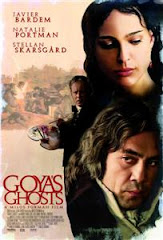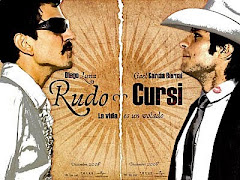
Arrancame la vida
Directed By: Roberto Sneider
(Mexico, 2008)
Based on the Novel By: Angeles Maestretta
This blog is devoted to promote cultural diversity on the Lake Erie College campus. These Movie Nights will allow students to engage in a cultural dialogue while experiencing diverse perspectives. Monday Night Movie Series will be held in Garfield, Room B-22 on Monday nights beginning at 6:00 p.m.










Review of Arráncame la vida
ReplyDeleteEscrito Por: Joseph Roskos
The film production of Ángela Mastretta’s Arráncame la vida excellently conveys certain aspects of the novel; however, the film has weaknesses that prevent it from maintaining consistency with the text of the novel. One area in which the movie succeeds in capturing the “feeling” of the novel is the development of the relationship between Catalina and Andrés in its initial stages. The youthful innocence of Catalina is conveyed well in various scenes throughout the movie. For example, during the sequence of scenes in which Andrés brings Catalina to his beach house near the sea, Catalina dreamily slouches on the door of Andrés’ sports car as they head towards the beach house. Furthermore, upon reaching their destiny, Catalina, almost like a puppy who is excited to see her owner return from work, excitedly moves freely up and down, as a young person who doesn’t have a care in the world, in order to see to catch a glimpse of their destination. Essentially, the film does a splendid job at capturing the innocence of Catalina in her youthful years. Yet, one area in which the film suffers is its depiction of Catalina’s relationship with Andrés in its later years. In the opinion of the writer, the film conveys their marriage as merely a relationship that has its “ups and downs,” or the preconceived notion that all relationships will be tested from time to time, which overall undermines the adverse psychological impacts that the relationship has on the mind of Catalina as it is conveyed in the novel. Particularly, there is a scene in the movie from the novel in which Catalina and Andrés are horseback riding through the countryside and eventually they reach the city. During this scene, Andrés says to Catalina, “No sabes montar, no sabes avisar, no sabías coger, ¿A qué dedicaste tus primeros quince años de vida?” The scene appears to undermine the meaning of this particular event as it somewhat portrays it as being comical. The significance of these words to Catalina’s development as a person is almost lost entirely. In conclusion, the film version of Arráncame la vida does a splendid job at conveying some personal qualities of the main characters, however, the film lacks in the area of conveying the development of the characters.